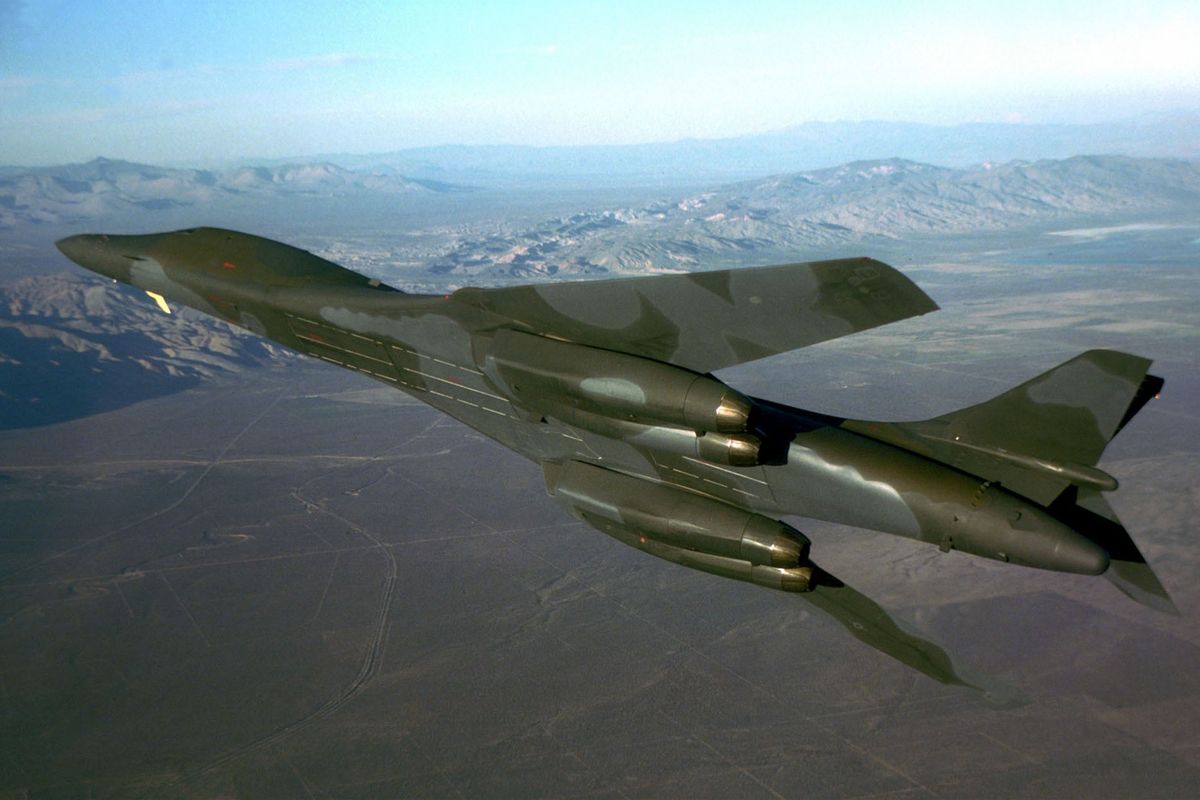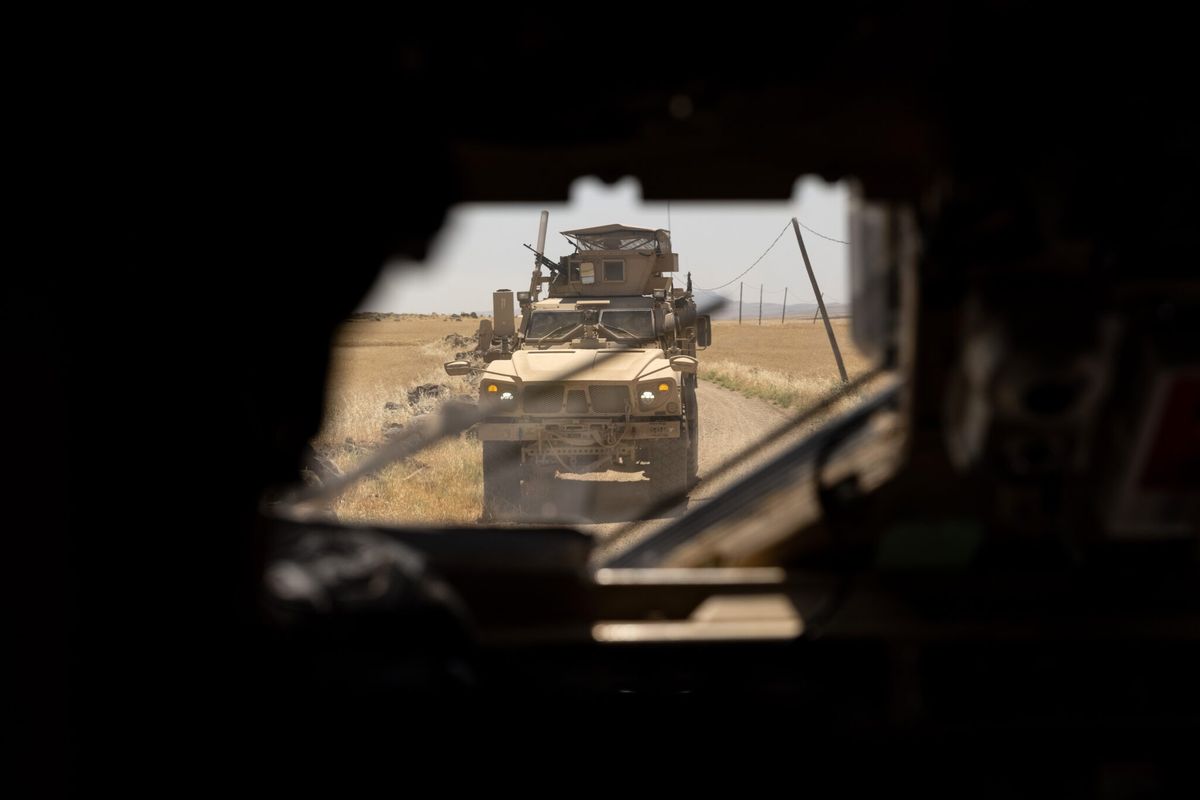The commander-in-chief and his national security team are sending mixed signals on U.S. policy in Syria. President Donald Trump on Tuesday said: “The primary mission in terms of that was getting rid of ISIS. We’ve almost completed that mission, and we’ll be making a decision very quickly, in coordination with others in the area, as to what we’ll do…I want to get out, I want to bring our troops back home.”
However, at almost the same time on Tuesday, senior U.S. officials speaking at the U.S. Institute for Peace in Washington reiterated the U.S. commitment to the military mission against ISIS in Syria. “We are in Syria to defeat ISIS. That is our mission and our mission isn’t over and we are going to complete that mission,” said Brett McGurk, U.S. Special Envoy for the Global Coalition to Defeat ISIS.
We reached out to a number of our experts with deep experience in Syria and the surrounding region to understand what’s at stake if the U.S. decided to withdraw militarily from Syria. Their thoughts are adapted for print below:
Robert Richer, Former Associate Deputy Director for Operations, CIA
The implications of a complete U.S. withdrawal from Syria would be significant. At present, the Kurds, both in Iraq and Syria, have seen the U.S. walk away from its commitments and abandon these key allies who were critical both in the war against ISIS and in countering Iranian influence in the region. Further, we would be abandoning the moderate Syrian opposition forces, like the 40,000-plus Syrian Free Army, which today are already being pressured by Syrian- and Russian-supported forces on the ground near the border with Jordan. With the collapse of these moderate forces along with the moderate Kurdish elements, opposition to the Assad regime will rest with the extremist elements and organizations—a serious concern which could lead to the rebuilding of groups like ISIS and al-Qaida in the region.
Further, the withdrawal will undoubtedly lead to a further displacement of Syrian refugees from the safe havens established along Jordan's border and in the enclaves to the north, near Turkey. None of the neighboring countries—Lebanon, Iraq, Jordan and Turkey—are prepared for a further influx of refugees.
In short, the withdrawal will expand the humanitarian disaster which is Syria today, lead to more pressure on critical allies in the region, foster recruitment for extremist organizations, cement Russia's role in the Middle East and expand Iranian influence.
Instead, the U.S. needs to reenergize its support to the moderate opposition elements, increase pressure on Syrian leader Bashar Assad via the Russians to get Assad to a fair negotiating table and to draw enforceable and realistic protected zones within Syria for those fleeing the Assad regime and extremist forces.
As negotiations are currently constructed, I see no potential for a diplomatic/political breakthrough in Syria. There is no viable and cohesive opposition grouping and there is no pressure on Assad to enter into negotiation when he's winning on the battlefield, reoccupying much of his country, with relatively endless support from Iran and Russia.
At present, the U.S. is seen as absent from the region. Our sole interests appear to be moving our embassy to Jerusalem and in fostering business deals with Saudi Arabia. The abdication of the U.S. in any significant role in the region, except on the Jerusalem issue, alleviates any significant pressure on Assad to negotiate or by regional and other related parties to force any type of compromise by Assad.
James Jeffrey, Former U.S. Ambassador to Iraq and Turkey
The primary U.S. goal in Syria should be to push back against Iranian hegemony over the Levant from Iraq to Lebanon and the related consolidation of a totalitarian Assad regime—both enabled by Russia. That is a game-changer and directly threatens our allies—Israel, Turkey, the Arab states—and the regional American-led security system.
Fighting ISIS remnants in our main areas of presence in Syria, which is the northeast, as well as an enclave around al Tanf in the far south, is a secondary but much less threatening interest.
Moreover, our experience from 2012-14 shows that if the regional security system does not deal with Iranian expansion through surrogates like former Iraqi Prime Minister Nouri al-Maliki and Assad into Sunni Arab areas, then populations will turn again to Sunni extremist movements like ISIS and al-Qaida.
So if the U.S. military completely withdrew from Syria, it would be disastrous to goals above. But there is a disconnect here. Trump seems to be talking specifically about the 2,000 ground troops we have in Syria.
Pulling them out, but keeping our air power active over areas we now occupy in the northeast to operate as a no-fly zone (and maintaining a small ground contingent in al Tanf, right on the Syrian border with Iraq), attack ISIS elements (including U.S. In-out ground raids) and help our local partner Syrian Defense Forces (SDF) hold off the Syrian regime/Iranian advances makes sense, to add a military component to our political containment of Iran and allies.
So we don’t need the ground forces inside Syria. They are mainly liaison, trainers, air controllers and support troops. They are far too small and are not organized to hold terrain or even defend themselves.
Furthermore, their authorization to be on the ground from Congress is only for operations against terrorists like ISIS. Central Command’s Gen. Joseph Votel made this crystal clear in congressional testimony.
Yet their presence encourages the Kurdish dominant component of the SDF, the PYD—which is the Syrian arm of the terrorist / insurgent Turkish Kurdish PKK—to avoid any compromises with Turkey, as Americans are on the ground with them, and makes Turkey think the U.S. is setting up a statelet, thus undercutting any joint Turkey-U.S. action against Iran and Assad.
The U.S. troops also are vulnerable as seen in recent days to attacks by ISIS, by Russian mercenaries and Assad/Iranian forces, Turks in the sensitive Manbij enclave, and even the PYD if disappointed in the lack of support against the Turks.
U.S. troops on the ground have also developed an emotional bond with the PYD Kurds that stymies rational Washington thinking on Syrian issues. Any effort to even tweak policy is met with resounding cries of selling out battle-buddy Kurds and opening the door to ISIS’ return. From 1991-2003, the U.S. coordinated with Iraqi Kurds, providing air cover but not ground troops, in a mutually successful operation without accepting their political agenda. It could work in Syria, with minimal liaison teams temporarily on the ground, like in Iraqi Kurdistan traveling back and forth as needed.
Assad and his allies are winning. But if the U.S. focused on this key threat, rather than emphasis on fighting ISIS, which is almost destroyed, then we could partner with Turks and Israelis who have forces in/over Syria and Arab states to exert diplomatic and military pressure on the regime from areas within Syria. This would encourage a Russian-Syrian compromise solution to the conflict that could include enforceable prohibition on Iranian power projection out of Syria.
Emile Nakhleh, Founding Director, CIA’s Political Islam Strategic Analysis Program
President Trump’s statement on a potential withdrawal from Syria is short-sighted and does not reflect a thorough discussion of the long-term implications this policy shift would have.
First, the withdrawal of U.S. military presence from Syria would eliminate whatever leverage the U.S. may have in deciding the future of the country beyond ISIS and Syrian President Bashar Assad. The fact is that our diplomatic withdrawal has already created a vacuum which our adversaries—including Iran and Russia—are filling.
The second fallout of this decision would be the creation of significant space for ISIS, al-Qaida and affiliated groups to expand. We have not paid enough attention to the resurgence of al-Qaida in Syria, which has been very active in some parts of the country.
Third, by withdrawing, we would give Turkey a free hand in dealing with Kurdish groups in Syria however they like. Some of these groups have been supported by the U.S., and abandoning them in this fashion sends a clear message to any groups that may consider cooperating with the U.S. in the future—that we are willing to let them twist in the wind. With that message in mind, why would local groups want to cooperate with the U.S. in the future, against terrorism or for other common goals?
Finally, this decision would have a significant negative impact on Jordan. If we withdraw our forces from Syria, it will increase the threat posed to the Hashemite Kingdom by ISIS and the rebranded al-Qaida groups, as we will have given them free reign to cross the border and cause havoc for the monarchy.
How do you see the likelihood of a diplomatic or political breakthrough in Syria?
If the U.S. leaves the country, the probability of a breakthrough goes to zero. Ultimately, no seriously diplomatic breakthrough will occur without U.S. involvement in an active leadership role; neither Russia nor Iran are interested in removing Assad or creating a path forward without him in power. By withdrawing militarily, the U.S. will be telling the whole world—and particularly the major actors in Syria—that the future of the country does not concern us, we are not active there, and they can do as they see fit. In the long term, that would be very destructive for not just Syria, but the entire Levant. Our disengagement in Syria will snowball and affect Jordan and Iraq as well.
If we remain in Syria, that will at least indicate that we are interested in what is happening in the country. But our military involvement is not sufficient. We can continue to kill ISIS fighters and reduce their territory, but if we are not engaged diplomatically, then it is unlikely there will be any sort of breakthrough regardless of our military involvement. Perhaps a 10 percent chance.












